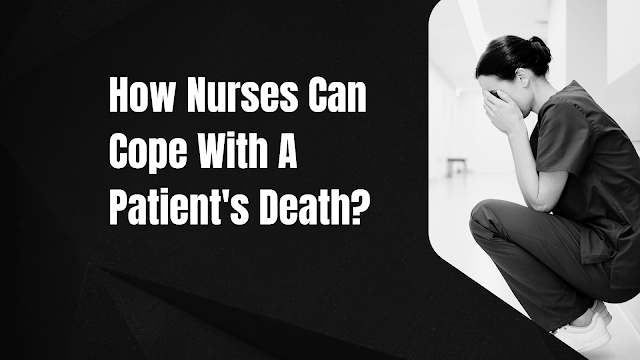Nurses are often exposed to death and dying in
their work, especially during the COVID-19 pandemic. Caring for a dying patient
and their family can be emotionally challenging and stressful for nurses, who
may experience grief, sadness, anger, guilt, or compassion fatigue. How can
nurses cope with a patient's death in a healthy way? Here are some tips that
may help.
Use peer support.
Talking to someone who understands what you
are going through can be helpful and comforting. You can reach out to your
colleagues, mentors, supervisors, or friends who are also nurses or work in
healthcare. They may have gone through similar situations and can offer you
empathy, advice, or just a listening ear. You can also use online platforms
like HearMe, which connects you with experienced nurses who can provide
peer-to-peer support via text messages.
Talk to a trained professional.
Sometimes peer support may not be enough and
you may need more professional help to cope with your emotions and stress. You
can seek counseling from a therapist, psychologist, psychiatrist, or social
worker who specializes in grief and trauma. They can help you process your
feelings, identify coping strategies, and provide you with resources and
referrals if needed. You can also contact your employee assistance program
(EAP) if your workplace offers one.
Accept the circumstances.
Another important step in coping with a
patient's death is to acknowledge what happened and accept it as part of your
job. Denying or avoiding the reality of death may only prolong your grief and
make it harder to heal. Instead of blaming yourself or others for what
happened, try to focus on what you did well and how you helped the patient and
their family in their final moments.
Take care of yourself.
Dealing with death can take a toll on your
physical and mental health, so it is essential to practice self-care regularly.
This means taking breaks from work when you need them, getting enough sleep and
rest, eating well-balanced meals, staying hydrated, exercising moderately,
engaging in hobbies or activities that bring you joy or relaxation, spending
time with loved ones who support you, meditating or praying for the dead and ownself, expressing
your emotions through writing or art, etc.
Seek education and training.
Learning more about death and dying can help
you cope better with it as a nurse. You can attend workshops, seminars,
webinars, courses, or programs that teach you about end-of-life care, palliative
care, bereavement care, communication skills, ethical issues, cultural
diversity, etc.
Join a debriefing session
A debriefing session is an opportunity for
nurses to share their experiences of caring for a dying patient with other
healthcare professionals who were involved in the same case. It is usually
facilitated by an expert such as a chaplain, social worker, nurse educator,
etc., who can guide the discussion, provide feedback, offer emotional support,
identify learning points, suggest improvements, etc. A debriefing session can
help nurses cope with a patient's death by allowing them to vent their
feelings, gain new perspectives, learn from each other, resolve conflicts,
enhance teamwork, improve the quality of care, etc.
Conclusion
Coping with a patient's death is not easy for
any nurse. However, by using these tips, you may be able to manage your grief
better. Remember that you are not alone. There are many resources available for
nurses who need help. Feel free to contact us if you need assistance. You
deserve it.

Comments
Post a Comment